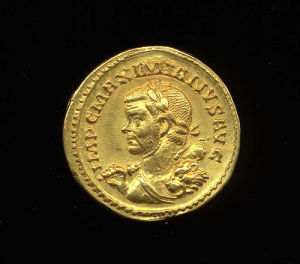Server check!
You are on the training database
Maximian
Reece Period attributed: Period 15

Member of the The Tetrarchy dynasty.
Coins for this issuer were issued from 286 until 310.
Maximian was born ca 250. He was adopted by Diocletian and made co-Augustus in 286; Maximian effectively ruled the western part of the empire while Diocletian dealt with problems in the north and east.
With Diocletian, Maximian restored the Forum in Rome and built a set of baths even bigger than Caracalla’s. He adopted Constantius as his son and successor when Diocletian adopted Maximian; he abdicated power with Diocletian in 305. However, Maximian did not take well to retirement. As a Senior Augustus, he continued to involve himself at times in affairs of the empire. He died at Marseilles in 310; he may have been murdered, or may have committed suicide.
Other resources about Maximian
- Dbpedia: http://dbpedia.org/resource/Maximian
- Wikipedia: http://en.wikipedia.org/wiki/Maximian
- VIAF: http://viaf.org/viaf/50478873
View all coins recorded by the scheme attributed to Maximian.
Information from Wikipedia

- Preferred label: Maximian
- Full names:
- Roman consul
- List of Roman consuls
- List of Roman emperors
- Constantius Chlorus
- Virius Gallus
- Cassius Dio (consul 291)
- Lucius Ragonius Quintianus
- Anicius Faustus Paulinus (consul 298)
- Marcus Magrius Bassus
- Gaius Junius Tiberianus
- Galerius
- L. Ragonius Quintianus
- M. Magrius Bassus
- Anicius Faustus Paulinus
- Virius Gallus
- Galerius
- Constantius Chlorus
- Afranius Hannibalianus
- Vettius Aquilinus
- Marcus Junius Maximus
- Diocletian
- Julius Asclepiodotus
- Caesars (heirs apparent)
- Imperial Roman consuls
- 3rd-century Roman emperors
- Deified Roman emperors
- Ancient Romans who committed suicide
- 3rd-century births
- 310 deaths
- Illyrian people
- Roman emperors to suffer posthumous denigration or damnatio memoriae
- Damnatio memoriae
- People from Sirmium
- Aurelii
- 4th-century Roman emperors
- Roman pharaohs
- Valerii
- Illyrian emperors
- Constantinian dynasty
- Tetrarchy
Denominations issued
- Argenteus - view all records of this denomination issued by Maximian I
- As - view all records of this denomination issued by Maximian I
- Aureus (Republic/Empire) - view all records of this denomination issued by Maximian I
- Sestertius - view all records of this denomination issued by Maximian I
- Semis - view all records of this denomination issued by Maximian I
- Dupondius or as - view all records of this denomination issued by Maximian I
- Nummus (AE 1 - AE 4) - view all records of this denomination issued by Maximian I
- Quadrans - view all records of this denomination issued by Maximian I
- Quinarius - view all records of this denomination issued by Maximian I
- Radiate (antoninianus) - view all records of this denomination issued by Maximian I
- Medallion - view all records of this denomination issued by Maximian I
Issuing mints
This video has been embedded from Adrian Murdoch's series of podcasts on the Emperors of Rome. Many thanks to him for allowing us to use these podcasts.


